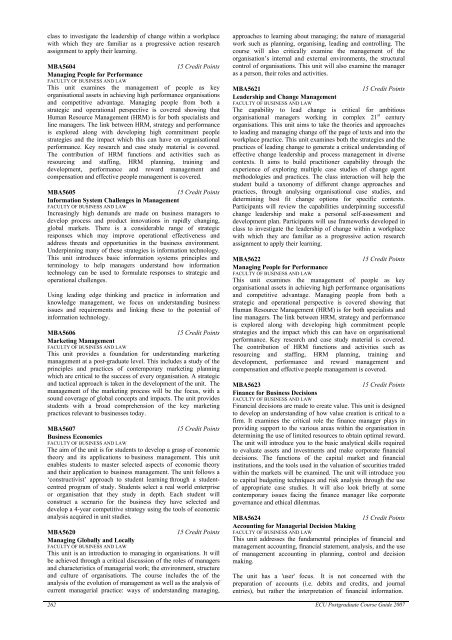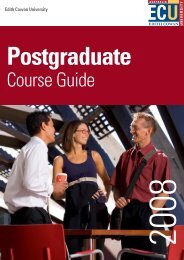Course Guide - Edith Cowan University
Course Guide - Edith Cowan University
Course Guide - Edith Cowan University
You also want an ePaper? Increase the reach of your titles
YUMPU automatically turns print PDFs into web optimized ePapers that Google loves.
class to investigate the leadership of change within a workplace<br />
with which they are familiar as a progressive action research<br />
assignment to apply their learning.<br />
MBA5604<br />
15 Credit Points<br />
Managing People for Performance<br />
FACULTY OF BUSINESS AND LAW<br />
This unit examines the management of people as key<br />
organisational assets in achieving high performance organisations<br />
and competitive advantage. Managing people from both a<br />
strategic and operational perspective is covered showing that<br />
Human Resource Management (HRM) is for both specialists and<br />
line managers. The link between HRM, strategy and performance<br />
is explored along with developing high commitment people<br />
strategies and the impact which this can have on organisational<br />
performance. Key research and case study material is covered.<br />
The contribution of HRM functions and activities such as<br />
resourcing and staffing, HRM planning, training and<br />
development, performance and reward management and<br />
compensation and effective people management is covered.<br />
MBA5605<br />
15 Credit Points<br />
Information System Challenges in Management<br />
FACULTY OF BUSINESS AND LAW<br />
Increasingly high demands are made on business managers to<br />
develop process and product innovations in rapidly changing,<br />
global markets. There is a considerable range of strategic<br />
responses which may improve operational effectiveness and<br />
address threats and opportunities in the business environment.<br />
Underpinning many of these strategies is information technology.<br />
This unit introduces basic information systems principles and<br />
terminology to help managers understand how information<br />
technology can be used to formulate responses to strategic and<br />
operational challenges.<br />
Using leading edge thinking and practice in information and<br />
knowledge management, we focus on understanding business<br />
issues and requirements and linking these to the potential of<br />
information technology.<br />
MBA5606<br />
15 Credit Points<br />
Marketing Management<br />
FACULTY OF BUSINESS AND LAW<br />
This unit provides a foundation for understanding marketing<br />
management at a post-graduate level. This includes a study of the<br />
principles and practices of contemporary marketing planning<br />
which are critical to the success of every organisation. A strategic<br />
and tactical approach is taken in the development of the unit. The<br />
management of the marketing process will be the focus, with a<br />
sound coverage of global concepts and impacts. The unit provides<br />
students with a broad comprehension of the key marketing<br />
practices relevant to businesses today.<br />
MBA5607<br />
15 Credit Points<br />
Business Economics<br />
FACULTY OF BUSINESS AND LAW<br />
The aim of the unit is for students to develop a grasp of economic<br />
theory and its applications to business management. This unit<br />
enables students to master selected aspects of economic theory<br />
and their application to business management. The unit follows a<br />
‘constructivist’ approach to student learning through a studentcentred<br />
program of study. Students select a real world enterprise<br />
or organisation that they study in depth. Each student will<br />
construct a scenario for the business they have selected and<br />
develop a 4-year competitive strategy using the tools of economic<br />
analysis acquired in unit studies.<br />
MBA5620<br />
15 Credit Points<br />
Managing Globally and Locally<br />
FACULTY OF BUSINESS AND LAW<br />
This unit is an introduction to managing in organisations. It will<br />
be achieved through a critical discussion of the roles of managers<br />
and characteristics of managerial work; the environment, structure<br />
and culture of organisations. The course includes the of the<br />
analysis of the evolution of management as well as the analysis of<br />
current managerial practice: ways of understanding managing,<br />
approaches to learning about managing; the nature of managerial<br />
work such as planning, organising, leading and controlling. The<br />
course will also critically examine the management of the<br />
organisation’s internal and external environments, the structural<br />
control of organisations. This unit will also examine the manager<br />
as a person, their roles and activities.<br />
MBA5621<br />
15 Credit Points<br />
Leadership and Change Management<br />
FACULTY OF BUSINESS AND LAW<br />
The capability to lead change is critical for ambitious<br />
organisational managers working in complex 21 st century<br />
organisations. This unit aims to take the theories and approaches<br />
to leading and managing change off the page of texts and into the<br />
workplace practice. This unit examines both the strategies and the<br />
practices of leading change to generate a critical understanding of<br />
effective change leadership and process management in diverse<br />
contexts. It aims to build practitioner capability through the<br />
experience of exploring multiple case studies of change agent<br />
methodologies and practices. The class interaction will help the<br />
student build a taxonomy of different change approaches and<br />
practices, through analysing organisational case studies, and<br />
determining best fit change options for specific contexts.<br />
Participants will review the capabilities underpinning successful<br />
change leadership and make a personal self-assessment and<br />
development plan. Participants will use frameworks developed in<br />
class to investigate the leadership of change within a workplace<br />
with which they are familiar as a progressive action research<br />
assignment to apply their learning.<br />
MBA5622<br />
15 Credit Points<br />
Managing People for Performance<br />
FACULTY OF BUSINESS AND LAW<br />
This unit examines the management of people as key<br />
organisational assets in achieving high performance organisations<br />
and competitive advantage. Managing people from both a<br />
strategic and operational perspective is covered showing that<br />
Human Resource Management (HRM) is for both specialists and<br />
line managers. The link between HRM, strategy and performance<br />
is explored along with developing high commitment people<br />
strategies and the impact which this can have on organisational<br />
performance. Key research and case study material is covered.<br />
The contribution of HRM functions and activities such as<br />
resourcing and staffing, HRM planning, training and<br />
development, performance and reward management and<br />
compensation and effective people management is covered.<br />
MBA5623<br />
15 Credit Points<br />
Finance for Business Decisions<br />
FACULTY OF BUSINESS AND LAW<br />
Financial decisions are made to create value. This unit is designed<br />
to develop an understanding of how value creation is critical to a<br />
firm. It examines the critical role the finance manager plays in<br />
providing support to the various areas within the organisation in<br />
determining the use of limited resources to obtain optimal reward.<br />
The unit will introduce you to the basic analytical skills required<br />
to evaluate assets and investments and make corporate financial<br />
decisions. The functions of the capital market and financial<br />
institutions, and the tools used in the valuation of securities traded<br />
within the markets will be examined. The unit will introduce you<br />
to capital budgeting techniques and risk analysis through the use<br />
of appropriate case studies. It will also look briefly at some<br />
contemporary issues facing the finance manager like corporate<br />
governance and ethical dilemmas.<br />
MBA5624<br />
15 Credit Points<br />
Accounting for Managerial Decision Making<br />
FACULTY OF BUSINESS AND LAW<br />
This unit addresses the fundamental principles of financial and<br />
management accounting, financial statement, analysis, and the use<br />
of management accounting in planning, control and decision<br />
making.<br />
The unit has a 'user' focus. It is not concerned with the<br />
preparation of accounts (i.e. debits and credits, and journal<br />
entries), but rather the interpretation of financial information.<br />
262 ECU Postgraduate <strong>Course</strong> <strong>Guide</strong> 2007



